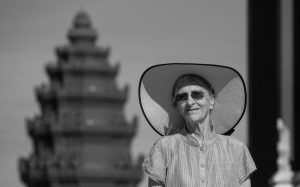Margaret Bywater has been a prominent figure in Cambodian civil society for more than three decades, working with refugees and helping to rebuild the education sector, primarily through libraries and the establishment of information services.
During the 1980s she toured refugee camps in Malaysia, Thailand, and Hong Kong before arriving in what was then known as Kampuchea in 1986. She later undertook a consultancy for the Ministry of Women’s Affairs in Afghanistan.
Working with Quaker Service Australia, Bywater lobbied for recognition of the Soviet-backed People’s Republic of Kampuchea and restoration of government aid, while backing efforts to find a peaceful solution to the long-running political impasse during the final years of the Cold War.
From 1984 to 1991 she served as an executive member of the Australian Council for Overseas Aid, chairing its Indochina Committee, and headed the Quaker Service Australia team responsible for English language teaching at the University of Phnom Penh’s Institute of Foreign Languages.
Many of her students would go on to hold important positions in government.
Bywater then spent 20 years developing professional librarianship with the Central Library at the University of Phnom Penh – now the Royal University of Phnom Penh – and the following year she joined the Asia Foundation as a library and information resources adviser.
Since 2014, she has provided training, developed a digital research library and services for researchers and fellows at the Parliamentary Institute of Cambodia, working as a full-time librarian specialist.
Bywater spoke with The Diplomat’s Luke Hunt about the extraordinary changes that have occurred in Cambodia since the 1980s, the transition to peace and economic growth, the importance of libraries, and delivering books in a time of war.

































